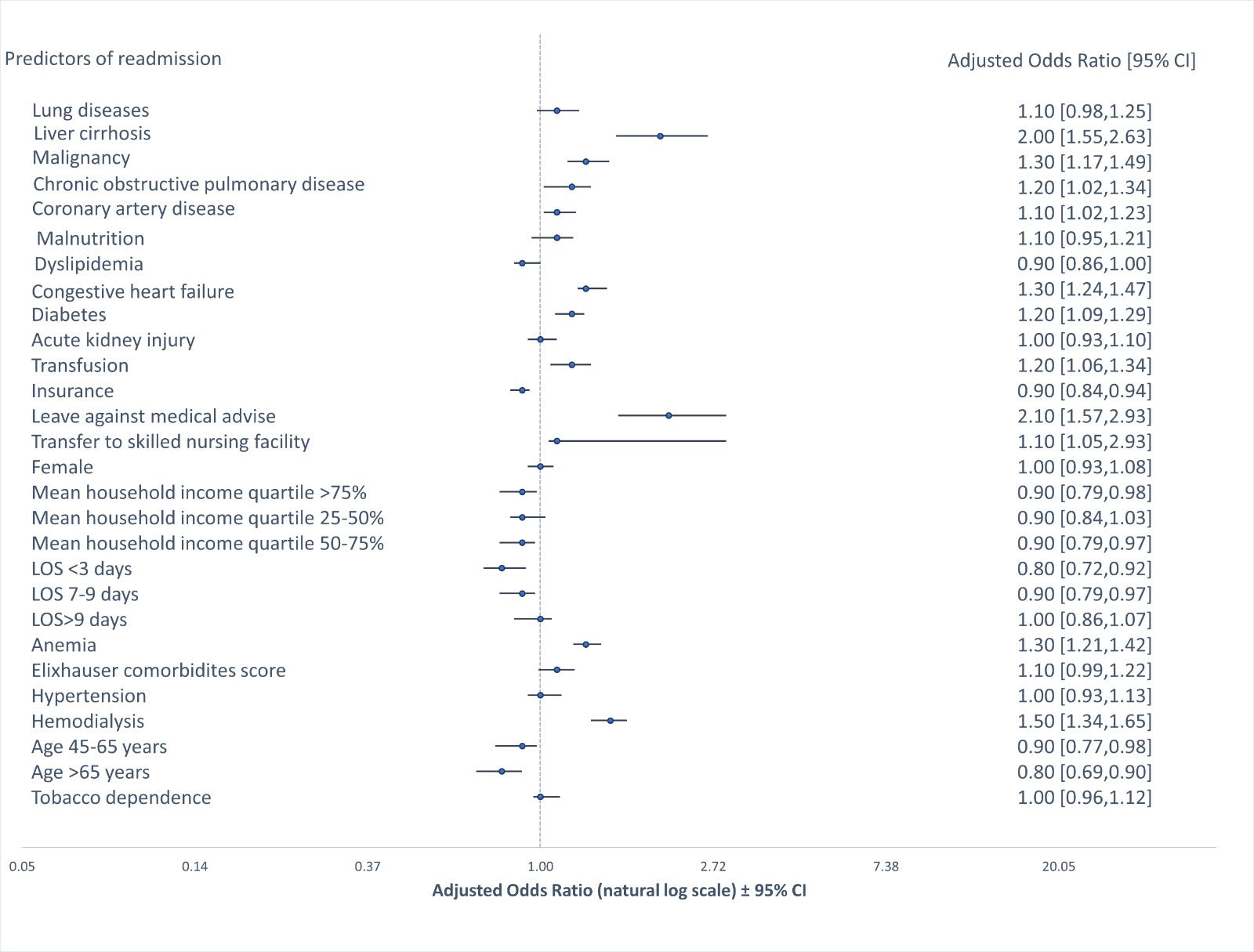Session Information
Session Type: Poster Session A
Session Time: 10:30AM-12:30PM
Background/Purpose: ANCA vasculitis is an immune-medicated inflammation affecting small-medium vessels and manifesting with a wide spectrum of clinical manifestations most commonly involving the lungs and kidneys. There is a paucity of data on readmissions of ANCA vasculitis patients. We wish to study the hospital readmission rates, common causes, and predictors of readmissions among patients with ANCA-associated vasculitis.
Methods: We used the National Readmission Database from 2016 to 2020 to extract data and identify all index hospitalizations with ANCA vasculitis as the principal diagnosis by using the ICD-10 CM codes. We used STATA 17.0 to analyze the most common specific principal diagnoses of ANCA vasculitis patients’ 90-day readmissions. Multivariate and univariate logistic and linear regression analyses were done to evaluate the predictors and adjust for potential confounders.
Results: A total of 34,022 adult patients with ANCA vasculitis were identified, out of which, 32,326 were discharged alive. Within 90 days of discharge, 9,765 (30.2%) were readmitted. Readmissions led to an additional 6.4 days mean length of hospital stay and a mean total hospital charge of $75,834. Those readmitted had higher proportions of older patients aged >65 years, belonged to a lower socioeconomic class with a mean household income quartile below the median, were insured with Medicare/Medicaid, and the majority had a higher burden of comorbidities with mean Elixhauser comorbidity index score >3, but were similar in gender and other hospital characteristics. The top five causes of readmissions were sepsis (10.1%), acute renal failure (ARF) (3.5%), pneumonia (3.3%), hypertensive heart failure with chronic kidney disease (CKD) (4.8%), and ANCA vasculitis (4.2%). Figure-1 shows the forest plot of a multivariate analysis of independent predictors of readmissions.
Conclusion: Within 90 days, 30.2% of ANCA vasculitis patients were readmitted, primarily due to sepsis, ARF, hypertensive heart failure with CKD, ANCA vasculitis, and pneumonia. Readmissions were from older age group, lower socioeconomic status, and higher comorbidity burdens. Hemodialysis, hypertension, COPD, CAD, cancer, cirrhosis, anemia and transfusions, shorter length of stay, leaving against medical advice, CHF, diabetes, higher Elixhauser comorbidity score, transfer to rehab/nursing center, and lack of insurance were predictors of readmissions. This underscores the need for better comorbidity management and post-discharge care for ANCA vasculitis patients.
To cite this abstract in AMA style:
Sami F, Gajjar R. Insights into Readmissions of ANCA-Vasculitis Patients: A Nationwide Analysis [abstract]. Arthritis Rheumatol. 2024; 76 (suppl 9). https://acrabstracts.org/abstract/insights-into-readmissions-of-anca-vasculitis-patients-a-nationwide-analysis/. Accessed .« Back to ACR Convergence 2024
ACR Meeting Abstracts - https://acrabstracts.org/abstract/insights-into-readmissions-of-anca-vasculitis-patients-a-nationwide-analysis/

